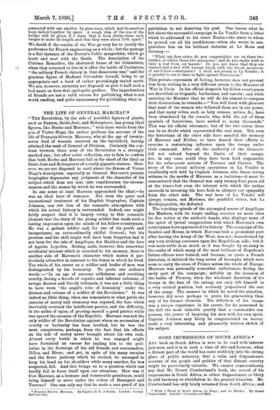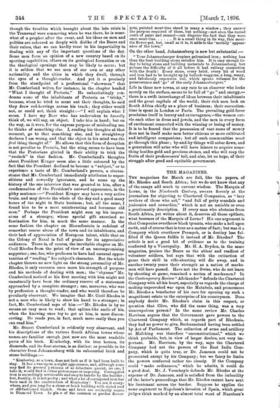SOME IMPRESSIONS OF SOUTH AFRICA.* ANY book on South Africa
is sure to be read with interest just now, and it is at such a time of stir and ferment, when a distant part of the world has come suddenly into the strong glare of public notoriety, that a calm and dispassionate account of the people and politics of that distant country might be particularly valuable. We cannot conscientiously say that Mr. Stuart Cumberland's book, the record of his impressions in South Africa, is either dispassionate or likely to add harmony or elucidation to the general situation. Mr. Cumberland has only lately returned from South Africa; and
• What I Think of South Africa, its Peopl,., and its Politics. By Stuart Cumberland. London : Chapman and Han.
though the troubles which brought about the late crisis in the Transvaal were simmering when he was there, he is some- what of a prophet after the event, and his ideas on men and politics are coloured so deeply with dislike of the Boers and their rulers, that we can hardly trust to his impartiality in dealing with any of the important questions of the day.
Some men form an opinion of a new country based on its sporting capabilities, others on its geological formation or on the theological openings that may be likely to occur; but it is seldom that we see men of our own or any other nationality, and the cities in which they dwell, through the eyes of a thought-reader. And yet it is precisely from the standpoint of a professional "showman" that Mr. Cumberland writes, for instance, in the chapter headed "What I thought of Pretoria." He unhesitatingly con- demns some of the inhabitants of Pretoria as "tricky," because, when he tried to scent out their thoughts, he said they drew red-herrings across his track ; they either would not, or could not, think straight :—" I will explain what I
mean. I have my Boer who has undertaken to honestly think of, we will say, an object. I take him in hand ; but on
the way, as it were, for the express purpose of misleading me,
he thinks of something else. I, reading his thoughts at that moment, go to that something else, and he straightway declares I am wrong, and that the object in his mind was the first thing thought of." He allows that this form of deception is not peculiar to Pretoria, but the sting seems to have been
that the Pretorians gloried in their ability to trick the " rooinek" in that fashion. Mr. Cumberland's thoughts about President Kruger seem also a little coloured by the fact that the President declined to become a "subject," or to experience a taste of Mr. Cumberland's powers, a circum- stance that Mr. Cumberland immediately attributes to super- stitious and cowardly ignorance, and he sums up the
history of the one interview that was granted to him, after a condemnation of the President's outward appearance, in the
pithy sentence :—" President Kruger may have a very active
brain, and may devote the whole of the day and a good many hours of the night to State business ; but, all the same, I found him to be a most uninteresting and boresome old
man." Perhaps the President might sum up his impres- sions of a stranger, whose special gift exercised no fascination for him, in much the same manner. In the same fashion the chapter on Bloemfontein is redolent of somewhat coarse abuse of the town and its inhabitants, and their lack of appreciation of European talent, while that on the Colony of Natal is full of praise for its appreciative audiences. There is, of course, the inevitable chapter on Mr.
Cecil Rhodes from the point of view of an uncompromising supporter ; one, too, who professes to have had unusual oppor- tunities of " reading " his subject's character. But the whole chapter throws no new light on the strong personality of Mr.
Rhodes, it only recounts once more his strength of purpose and his methods of dealing with men ; the "shyness" Mr. Cumberland noticed at his first meeting with him might not unnaturally have been the ordinary reserve of a statesman approached by a complete stranger ; one, moreover, who was by profession a thought-reader, and who would therefore be peculiarly observant. We imagine that Mr. Cecil Rhodes is not a man who is likely to show his hand to a stranger ; in fact, Mr. Cumberland says of him :—" Mr. Rhodes is by no means an easy man to read ; that sphinx-like smile of his, when the knowing ones try to get at him, is most discon- certing. He reads you, in fact, much more easily than you can read him."
Mr. Stuart Cumberland is evidently very observant, and his descriptions of the various South African towns whose names are familiar enough just now are the most readable parts of his book. Kimberley, with its iron houses, its diamonds, and its dust-storms, is as distinct as possible in its character from Johannesburg with its substantial brick and stone buildings :—
"Kimberley, as a town, does not look as if it had been built to stay. It has a run-up-in a-night appearance, and, although some may find its general jerkiness of ar, hitecture quaint, no one, I take it, would find it either picturesque or imposing. Corrugated iron is exceedingly serviceable and easy to handle by the builder ; but, frankly, it is not pretty ; and what a lot of corrugated iron has been used in the construction of Kimberley ! You see it every- where, and you long for a stone or brick building with slated roof or &a-fashioned thatch. Stone and brick are evidently scarce in Diamond Town In pla sa of the common or garden flower- pots, painted meat-tins stand in many a window ; they answer the purpose required of them, but nothing—not even the varied coats of paint and enamel—can disguise the fact that they were once meat-tins It is a small thing in its way, this meat- tin flower-pot, but, small as it is, it adds to the metally ' appear- ance of the town."
On the other hand, Johannesburg is new but substantial :— " Your Johannesburger despises galvanised iron ; nothing less than the best building-stone satisfies him. It is easy enough to- day to bring stone and building materials to Johannesburg, but picture the difficulty of it all before it had railway connection with the South ! Every stone, every brick, every bit of wood and iron had to be brought up by bullock-waggons, a long, weary, and fabulously expensive toil, which speaks volumes for the perseverance and ' go ' of the early Johaxuaesburgers."
Life in these new towns, at any rate to an observer who looks merely on the surface, seems to be full of " go " and energy,— there is a swift interchange of ideas between their inhabitants and the great capitals of the world; their rich men look on South Africa chiefly as a place of business; their recreation- time is spent in London or Paris. The prevailing gold-fever proclaims itself in luxury and extravagance,—the women out- vie each other in dress and jewels, and the men in every form of excitement connected with the winning or losing of money.
It is to be feared that the possession of vast sums of money does not in itself make men better citizens or more cultivated and intelligent companions ; but all such communities must go through this phase ; by-and-by things will sober down, and
a generation will arise who will have leisure to acquire some- thing besides gold and precious stones, and who will reap the fruits of their predecessors' toil, and also, let us hope, of their struggle after good and equitable government.







































 Previous page
Previous page